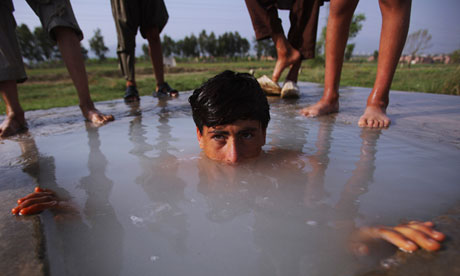Pakistan's burgeoning population of young people is highly conservative, overwhelmingly pessimistic about the future and has a very low opinion of democracy, a study has found.
With historic general elections weeks away, the survey commissioned by the British Council found the country's politicians will struggle to inspire an army of despairing first-time young voters, particularly as more than half of those surveyed do not think democracy has benefited them.
Government, parliament and political parties are all held in overwhelming contempt by Pakistanis aged 18-29, while the army and religious organisations are the two most popular institutions in the country. The survey of 5,271 young people is a sobering reminder of the challenges posed by Pakistan's peculiar demographics, where 46% of the population is aged between 15-29.
The troubled nation's vast youth bulge has been seen as a cause for optimism by some observers, with hopes pinned on a wave of young people pouring into the workforce in the coming decades that should trigger dramatic economic growth and development.
But the report warns that Pakistan faces a demographic disaster if it fails to use its young people. Talent was wasted by an "education emergency", a poor climate for business investors and high unemployment – half of the "next generation" does not work, according to the report.
"Pakistan could be one of the first countries ever to grow old before it has grown rich," it said, pointing out that the country will start to age by mid-century.
It also makes depressing reading for the politicians gearing up for general elections on 11 May, when more than 30% of the electorate is aged 18 to 29.
The survey found 94% thought the country was going in the wrong direction, with much of the blame laid at the door of the civilian institutions that have run the country since power was seized back from the army in 2008.
It said 71% had an unfavourable opinion of the government, 67% of parliament and 69% viewed political parties unfavourably. By contrast, 77% of young people approve of the army, while 74% were favourable inclined towards religious organisations.
Only 29% of young people believe democracy is the best political system for Pakistan. Military rule would be preferred by 32% and Sharia law by 38%.
With 13m new votes up for grabs among an army of first-time voters, there is a "transformational opportunity for any party that succeeds in motivating young voters to go to the polls", the report said. However, only 40% are certain to vote.
Imran Khan, cricket star turned politician, hoping to pull off the unlikely coup of going from zero seats in parliament to enough to lead the next government, is banking heavily on young people who flock to his mega rallies.
The survey shows the primary youth concerns are economic, with people worrying about soaring inflation, a jobs crisis and poverty.
Because fewer than half of young women are expecting to vote, the report branded housewives a "potential game-changer" if more of them could be inspired to take part in elections.
"Basically the ideal candidate to get the housebound women out is Margaret Thatcher in burqa," said Fasi Zaka, a columnist who was a member of the taskforce that helped produce the report for the British Council.
"They are fundamentally worried about their economic position and they are conservative, they want someone that talks about values."
According to the report, moderates and liberals are a minority among Pakistan's youth, with two-thirds of women and 64% of men describing themselves as religious or conservative.
Some commentators fear the most likely result of the election will be a hung parliament, or a shaky coalition led by one of the two established parties, that would struggle to deliver the economic growth and jobs that young people crave.
Original Source: The Guardian



You need to be a member of Network for Youth in Transition to add comments!
Join Network for Youth in Transition